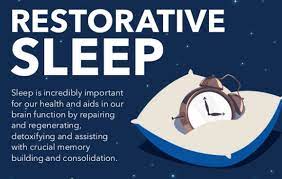Restorative Sleep: The Key to a Healthy and Happy Life
Sleep is essential for our physical and mental well-being. It is during sleep that our bodies repair and regenerate, and our brains process information and consolidate memories. However, not all sleep is created equal. Restorative sleep, also known as deep or slow-wave sleep, is the type of sleep that provides the most benefits for our health and happiness.
Restorative sleep occurs during the first half of the night, usually in cycles of 90 minutes. During this stage of sleep, our brain waves slow down, and our breathing becomes deeper and more regular. Our muscles relax, and our body temperature drops slightly.
Restorative sleep is crucial for physical recovery. It stimulates the release of growth hormone, which helps repair tissues and build muscle mass. It also boosts our immune system by increasing the production of cytokines, proteins that fight infections and inflammation.
But restorative sleep is not only important for physical health; it also plays a vital role in mental health. During restorative sleep, our brain processes emotions and consolidates memories from the day before. It helps us regulate our mood and improve cognitive functions such as attention, concentration, and problem-solving.
Unfortunately, many people struggle to get enough restorative sleep due to various factors such as stress, anxiety, poor diet, lack of exercise or exposure to blue light from electronic devices before bedtime.
To improve your chances of getting restorative sleep:
- Stick to a regular schedule: Try to go to bed at the same time every night and wake up at the same time every morning.
- Create a relaxing bedtime routine: Take a warm bath or shower before bedtime; read a book or listen to calming music; avoid stimulating activities such as watching TV or using electronic devices.
- Make your bedroom conducive to sleep: Keep your room cool (between 60-67 degrees Fahrenheit), dark, quiet and comfortable; invest in a good quality mattress and pillows.
- Avoid caffeine, alcohol, and nicotine: These substances can interfere with sleep quality and disrupt the restorative stage of sleep.
- Practice relaxation techniques: Meditation, deep breathing, or yoga can help reduce stress and promote relaxation.
In conclusion, restorative sleep is an essential component of a healthy and happy life. By prioritizing good sleep habits, we can improve our physical and mental well-being and enhance our overall quality of life.
Your Complete Guide to Restorative Sleep: Answers to 7 Frequently Asked Questions
- What is restorative sleep?
- How can I get better restorative sleep?
- How much restorative sleep do I need?
- What are the benefits of restorative sleep?
- How does my lifestyle affect my restorative sleep?
- What can I do to improve my restorative sleep quality?
- What foods or drinks help promote restorative sleep?
What is restorative sleep?
Restorative sleep is a type of sleep that provides the most benefits for our physical and mental health. It is also known as deep or slow-wave sleep and occurs during the first half of the night, usually in cycles of 90 minutes. During this stage of sleep, our brain waves slow down, and our breathing becomes deeper and more regular. Our muscles relax, and our body temperature drops slightly. Restorative sleep stimulates the release of growth hormone, which helps repair tissues and build muscle mass. It also boosts our immune system by increasing the production of cytokines, proteins that fight infections and inflammation. Additionally, restorative sleep plays a vital role in mental health by helping us regulate our mood and improve cognitive functions such as attention, concentration, and problem-solving.
How can I get better restorative sleep?
Getting better restorative sleep involves adopting healthy sleep habits and making lifestyle changes that promote relaxation and reduce stress. Here are some tips on how to improve your chances of getting better restorative sleep:
- Stick to a regular sleep schedule: Try to go to bed at the same time every night and wake up at the same time every morning, even on weekends.
- Create a relaxing bedtime routine: Develop a pre-sleep routine that helps you wind down and relax before bedtime. This may include taking a warm bath or shower, reading a book, or listening to calming music.
- Make your bedroom conducive to sleep: Create an environment that is cool, dark, quiet, and comfortable for sleeping. Invest in a good quality mattress and pillows.
- Avoid caffeine, nicotine, and alcohol: These substances can interfere with sleep quality and disrupt the restorative stage of sleep.
- Exercise regularly: Regular physical activity can help reduce stress and promote relaxation, which can improve the quality of your sleep.
- Practice relaxation techniques: Meditation, deep breathing exercises, or yoga can help reduce stress and promote relaxation before bedtime.
- Limit exposure to electronic devices before bedtime: The blue light emitted by electronic devices such as smartphones or tablets can interfere with your body’s natural sleep-wake cycle.
- Manage stress levels: Stress can interfere with your ability to fall asleep and stay asleep. Try stress-reducing techniques such as mindfulness meditation or cognitive-behavioral therapy (CBT) if you are experiencing chronic stress or anxiety.
- Consider seeing a healthcare provider if you have persistent trouble sleeping or if you suspect you have an underlying medical condition that may be affecting your sleep quality.
By adopting these healthy habits and making lifestyle changes that promote relaxation and reduce stress, you can improve your chances of getting better restorative sleep and enjoy the many benefits it provides for your physical and mental well-being.
How much restorative sleep do I need?
The amount of restorative sleep you need depends on your age and individual needs. Generally, adults need about 1-2 hours of restorative sleep per night, which is about 20% of their total sleep time. For most adults, this means getting between 1.5 to 2 hours of deep sleep per night.
However, it’s important to note that the amount and quality of restorative sleep can vary from person to person. Some people may naturally require more or less deep sleep than others. Additionally, factors such as stress, illness, and medications can affect the amount and quality of restorative sleep you get.
The best way to determine how much restorative sleep you need is to pay attention to your body’s signals. If you consistently wake up feeling refreshed and energized, chances are you’re getting enough restorative sleep. On the other hand, if you wake up feeling tired and groggy despite getting a full night’s sleep, you may not be getting enough deep sleep.
If you’re concerned about your quality or quantity of restorative sleep, it’s always a good idea to talk to your doctor or a sleep specialist who can help evaluate your sleeping patterns and provide personalized recommendations for improving your overall sleep health.
What are the benefits of restorative sleep?
Restorative sleep, also known as deep or slow-wave sleep, is the type of sleep that provides the most benefits for our health and happiness. Here are some of the benefits of restorative sleep:
- Physical recovery: Restorative sleep stimulates the release of growth hormone, which helps repair tissues and build muscle mass. It also boosts our immune system by increasing the production of cytokines, proteins that fight infections and inflammation.
- Mental health: During restorative sleep, our brain processes emotions and consolidates memories from the day before. It helps us regulate our mood and improve cognitive functions such as attention, concentration, and problem-solving.
- Reduced stress: Restorative sleep can help reduce stress levels by lowering cortisol levels in the body.
- Improved cardiovascular health: Restorative sleep can lower blood pressure and reduce the risk of cardiovascular disease.
- Enhanced athletic performance: Restorative sleep is essential for athletes as it promotes physical recovery and improves reaction time, accuracy, and speed.
- Weight management: Lack of restorative sleep can disrupt the hormones that regulate appetite and metabolism, leading to weight gain or obesity.
- Better skin health: Restorative sleep allows our skin to repair itself by producing collagen, reducing wrinkles, and improving overall skin texture.
In conclusion, restorative sleep is an essential component of a healthy lifestyle as it provides numerous physical and mental health benefits. By prioritizing good sleep habits such as sticking to a regular schedule, creating a relaxing bedtime routine, making your bedroom conducive to sleep, avoiding stimulants before bedtime, practicing relaxation techniques you can improve your quality of life.
How does my lifestyle affect my restorative sleep?
Your lifestyle can have a significant impact on your restorative sleep. The choices you make during the day and before bedtime can affect the quality and quantity of your sleep. Here are some lifestyle factors that can influence your restorative sleep:
- Diet: What you eat and drink can affect your sleep. Eating a heavy meal or consuming caffeine, alcohol, or nicotine close to bedtime can disrupt your sleep and prevent you from entering the restorative stage.
- Exercise: Regular exercise can improve the quality of your sleep, but exercising too close to bedtime can make it harder for you to fall asleep and enter the restorative stage.
- Stress: Chronic stress can interfere with your ability to fall asleep and stay asleep. Finding ways to manage stress through relaxation techniques such as meditation or yoga can help promote restorative sleep.
- Exposure to blue light: Blue light from electronic devices such as smartphones, tablets, and computers can interfere with the production of melatonin, a hormone that regulates sleep-wake cycles. Avoiding electronic devices for at least an hour before bedtime can help improve the quality of your restorative sleep.
- Sleep environment: Creating a conducive sleep environment by keeping your bedroom cool, dark, quiet, and comfortable can help promote restorative sleep.
- Sleep schedule: Going to bed at different times each night or not getting enough hours of sleep consistently can disrupt your body’s natural circadian rhythm, making it harder for you to enter the restorative stage of sleep.
In conclusion, making positive lifestyle choices such as eating a healthy diet, managing stress levels, avoiding electronic devices before bedtime, creating a comfortable sleeping environment, and maintaining a consistent sleep schedule are essential for promoting restorative sleep. By prioritizing good sleep habits in your daily life, you will be able to experience all the benefits that come with getting enough deep and restful sleep each night.
What can I do to improve my restorative sleep quality?
There are several things you can do to improve your restorative sleep quality:
- Stick to a regular sleep schedule: Try to go to bed and wake up at the same time every day, even on weekends.
- Create a relaxing bedtime routine: Develop a relaxing bedtime routine that helps you wind down before sleep. This could include taking a warm bath or shower, reading a book, or listening to calming music.
- Make your bedroom conducive to sleep: Keep your bedroom cool, dark and quiet. Invest in comfortable bedding and consider using blackout curtains or an eye mask if necessary.
- Avoid stimulants: Avoid caffeine, nicotine, and alcohol close to bedtime as they can interfere with sleep quality.
- Exercise regularly: Regular exercise can help improve sleep quality and duration.
- Manage stress: Stress can negatively impact sleep quality. Consider practicing relaxation techniques such as meditation or deep breathing exercises before bed.
- Limit screen time before bed: The blue light emitted by electronic devices can disrupt our natural sleep-wake cycle and make it harder to fall asleep. Try turning off your devices at least an hour before bedtime.
By following these tips and prioritizing good sleep habits, you can improve the quality of your restorative sleep and enjoy the many benefits that come with it.
What foods or drinks help promote restorative sleep?
Certain foods and drinks can help promote restorative sleep by providing the body with the nutrients it needs to support healthy sleep. Here are some examples:
- Cherries: Cherries are a natural source of melatonin, a hormone that regulates sleep-wake cycles. Eating cherries or drinking cherry juice before bedtime may help improve sleep quality.
- Almonds: Almonds are a good source of magnesium, a mineral that promotes relaxation and helps regulate the body’s internal clock. Eating a handful of almonds before bedtime may help improve sleep quality.
- Kiwi: Kiwi is another fruit that contains high levels of serotonin, which can help regulate the sleep cycle and improve sleep quality.
- Warm milk: Warm milk contains tryptophan, an amino acid that helps promote relaxation and induce sleepiness. Drinking warm milk before bedtime may help improve sleep quality.
- Herbal tea: Certain herbal teas, such as chamomile or valerian root tea, have calming properties that can help promote relaxation and improve sleep quality.
It’s important to note that while certain foods and drinks can help promote restorative sleep, they should be consumed in moderation and as part of an overall healthy diet. Additionally, it’s best to avoid consuming caffeine or alcohol close to bedtime as they can disrupt the restorative stage of sleep.




